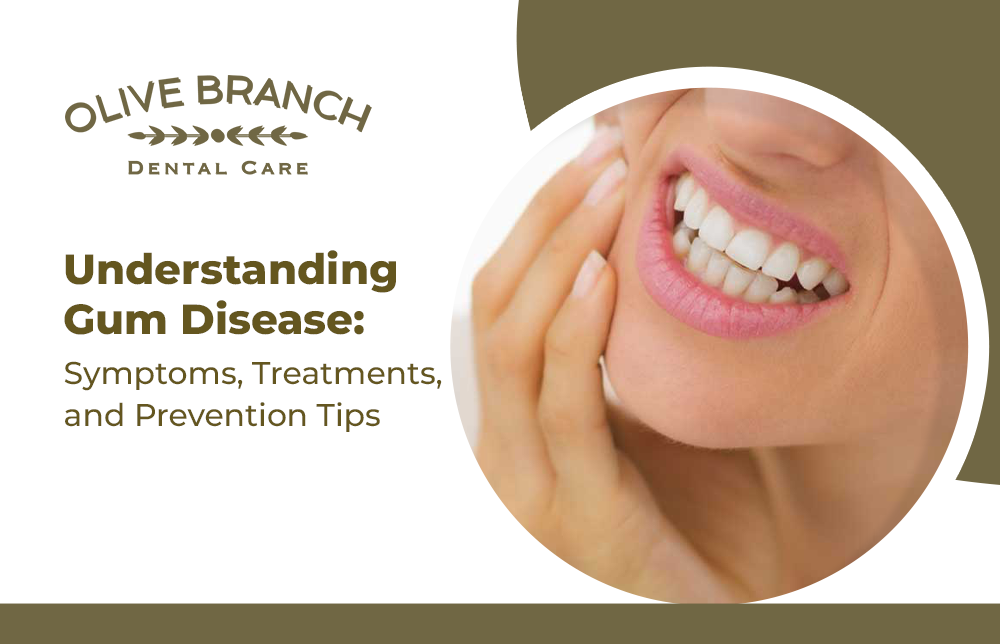Gum disease, also known as periodontal disease, is a common but preventable condition affecting the tissues surrounding and supporting the teeth. It ranges from simple gum inflammation (gingivitis) to serious conditions that result in major damage to the soft tissue and bone that support the teeth. Understanding the symptoms, treatments, and prevention strategies for gum disease is crucial for maintaining optimal oral health. To know more visit Olive Branch Dental Care.
Symptoms of Gum Disease
The initial stage of gum disease is gingivitis, characterized by redness, swelling, and bleeding of the gums. These symptoms are often mild and can be overlooked:
- Red, Swollen Gums: Healthy gums are usually pink and firm. If your gums appear red or are swollen, it could be a sign of gingivitis.
- Bleeding Gums: Gums that bleed easily during brushing or flossing are another early sign.
- Bad Breath: Persistent bad breath or a bad taste in the mouth can indicate underlying gum disease.
- Receding Gums: When the gums start to pull away from the teeth, it creates pockets where bacteria can accumulate.
- Loose Teeth: In advanced stages, the supporting bone and tissue can be destroyed, leading to loose or shifting teeth.
Treatments for Gum Disease
Treating gum disease early is essential to prevent its progression. Treatments vary based on the severity of the condition:
- Professional Cleaning: The first step is often a professional dental cleaning to remove plaque and tartar. Scaling and root planing can clean below the gum line and smooth rough spots on the tooth roots.
- Medications: Antibiotic gels, oral antibiotics, or antiseptic mouthwashes may be prescribed to control bacterial infection.
- Surgical Treatments: In severe cases, surgical procedures may be necessary. These can include flap surgery, which involves lifting the gums to remove tartar, or bone and tissue grafts to regenerate damaged areas.
- Laser Therapy: Some dentists use laser therapy to reduce the size of pockets and eliminate diseased tissue.
Regular dental check-ups and cleanings are crucial for monitoring and maintaining gum health. If caught early, gum disease can often be reversed with good oral hygiene practices.
Prevention Tips for Gum Disease
Preventing gum disease is largely about maintaining good oral hygiene and making healthy lifestyle choices:
- Brush Regularly: Brush your teeth at least twice a day with fluoride toothpaste. Make sure to brush along the gum line to remove plaque effectively.
- Floss Daily: Flossing helps remove food particles and plaque between teeth and under the gum line where your toothbrush can’t reach.
- Use Mouthwash: Antimicrobial mouthwash can reduce plaque and help prevent gingivitis.
- Healthy Diet: A balanced diet low in sugar and rich in nutrients helps support gum health. Vitamin C and calcium are particularly beneficial.
- Quit Smoking: Smoking is a significant risk factor for gum disease. Quitting smoking can improve gum health and overall health.
- Regular Dental Visits: Schedule regular check-ups and professional cleanings with your dentist. Early detection and treatment of gum issues can prevent more serious problems.
- Stay Hydrated: Drinking plenty of water helps wash away food particles and bacteria and keeps your mouth moist.
- Use Proper Technique: Ensure you are using the correct brushing and flossing techniques. Ask your dentist for a demonstration if you’re unsure.
Importance of Early Intervention
Gum disease can have serious implications if left untreated, including tooth loss and an increased risk of systemic health issues like heart disease and diabetes. Early intervention is crucial. Regular dental visits allow your dentist to detect early signs of gum disease and provide timely treatment.
By following these prevention tips and seeking prompt treatment at the first sign of trouble, you can maintain healthy gums and a beautiful smile. Remember, your oral health is closely linked to your overall health, so taking care of your gums is an investment in your well-being.
Conclusion
Understanding the symptoms, treatments, and prevention strategies for gum disease is essential for maintaining oral health. By staying informed and proactive, you can prevent gum disease from progressing and ensure that your smile stays healthy and bright. To know more contact us today.


Recent Comments